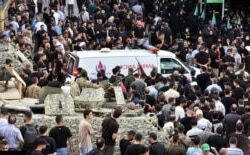Beirut, Lebanon – The land where ancient cedar trees still stand tall, now trembles. A place once known for its resilience faces yet another chapter of sorrow. Twenty lives, so vibrant and full, were snatched away in an instant on a day the sun seemed reluctant to rise. They were lost to explosions — not of weapons launched from across borders, but from the simplest tools of communication, walkie-talkies. These devices, intended to connect, instead became agents of destruction, detonated with a cruelty no one foresaw.
The Hezbollah fighters, men hardened by years of conflict, had gathered to mourn their fallen brothers. But in the midst of their grief, another wave of pain came for them. One explosion struck near a funeral procession for three Hezbollah members and a young boy. A funeral meant to honor the dead was disrupted by a force meant to silence the living.
And the country, already wearied by war, could do little but cry out in anguish.
Echoes of Grief and Fear
Only a day earlier, a similar horror unfolded. Explosions, silent before their violent screams, erupted from thousands of pagers, innocent devices meant to transmit messages. Yet, they carried no ordinary message. When those who wore them on their hips and held them in their hands heard the beep, they expected words of instruction. Instead, in a moment too brief to understand, the pagers exploded, leaving thousands wounded. Hands that had only moments before caressed these devices were now maimed. Eyes that sought to read a simple message would never see again. Their world shattered in a breath.
Children, the ones who should be running in fields, laughing, dreaming, were instead caught in the blast. Among them, a young girl, injured while standing in her own home, her face marred by an explosion not of her making. In homes across Beirut and the southern regions of this ancient land, solar power systems too, inexplicably, became weapons.
A Web of Suspicions and Retaliation
In the streets, the whispers grow louder. Who is responsible? Hezbollah places the blame squarely on Israel. Others, experts from Middle Eastern and American security, point to the shadowy hand of Mossad, Israel’s storied intelligence agency, always rumored to move in silence and subterfuge. They say it was no accident that these devices — pagers and walkie-talkies — were tainted long before reaching Hezbollah’s hands. They whisper of a calculated, surgical operation, months in the making.
In retaliation, Hezbollah has fired rockets at Israeli artillery positions, a move that, to many, feels like the first step on a path too familiar — a path leading to war.
As the violence grows, a once fragile peace hangs by a thread. Israel has sent more troops to its northern borders, while Hezbollah, bruised but not broken, stands defiant. But even as leaders plot their next moves, it is the people — ordinary men, women, and children — who are left to wonder: What comes next?
A Delicate Balance on the Edge of War
In Egypt, under the sun that has seen empires rise and fall, Antony Blinken, the U.S. Secretary of State, speaks cautiously. “The world is watching,” he warns, his voice steady but his eyes reflecting the weight of uncertainty. In every corner of the Middle East, hearts quicken, as leaders weigh their actions with the knowledge that even the smallest misstep could ignite a conflagration.
Through a translator, Egypt’s Foreign Minister, Badr Abdelatty, stands beside him. “We are at the brink of war,” he says. His words fall heavy, like stones cast into still water, sending ripples across the region.
In the distant halls of the United Nations, Antonio Guterres, the Secretary-General, expresses his deep alarm. He urges restraint, pleads for a calm that seems ever elusive. But even he knows, as do those on the streets of Beirut and Tel Aviv, that peace is fragile and too often fleeting.
A Nation Wounded, a Region on Edge
Even as Lebanon mourns, Iran, Hezbollah’s enduring ally, speaks of revenge. Their ambassador, Mojtaba Amani, himself injured in the explosion, now blindsided, missing an eye, reflects a deeper wound — the pain of a nation intertwined with the fate of Hezbollah. In a letter that echoes across diplomatic corridors, Iran declares it may respond, its words a dark promise hanging in the air.
In Tehran, whispers rise, much like they do in Beirut. The fires of conflict are no longer distant; they are at the doorstep. The fear of a broader war — one that sweeps across Lebanon, Israel, Iran, and beyond — feels too close, too real.
A Message Beyond the Bombs
This tragedy — these explosions of pagers and walkie-talkies — is not merely a tactic of war. It is a message, one aimed not just at soldiers but at the people of Lebanon, of the Middle East, and the world. A message that asks: Who can you trust?
As Daniel Hoffman, a former CIA officer, suggests, this is more than a simple act of sabotage. It’s a calculated blow meant to fracture Hezbollah’s strength, to undermine its presence among the people. “The message is clear,” he says. “Do not stand too close to them.”
The Unseen Threads of Fate
In the quiet moments, when the dust settles and the echoes of explosions fade, the people of Lebanon — those who have survived — are left with a singular truth. War is not just fought with weapons. It is fought in hearts and minds, in the spaces between trust and fear, between ally and enemy. And today, in those spaces, shadows grow.
Yet, despite the pain, this land of cedars, this land that has survived so much, still stands. And its people, weary though they may be, will face tomorrow with the same resilience they have shown for centuries.
Because in Lebanon, as in all places touched by war, hope is never truly extinguished.


